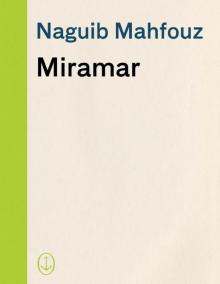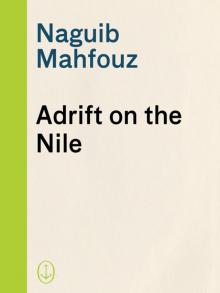- Home
- Naguib Mahfouz
The Seventh Heaven: Supernatural Tales Page 8
The Seventh Heaven: Supernatural Tales Read online
Page 8
I kept silent, both wary and reflective at the same time. Then he continued, “By the same logic, my dear friend, the identical accusation could be directed at you.”
“Me?” I chuckled.
“Why not?” he retorted. “The crimes continued despite the increased guard and heightened vigilance of the informers. How did the culprit penetrate the well-mined district? He must have been confident that no one from the security forces would have suspected him. Terrific…. Who could this be if not the man in charge of surveillance? In other words, you.”
I laughed harder and taunted, “And the incidents in Tanta?”
“The incidents in Tanta definitely happened, and so did your trip to that city. Whether your travel there came before or after these phenomena, I have no idea!”
“Great,” I said, still laughing. “But what was the motive for all this mayhem?”
“The same one that, buried deep within the criminal, you wore yourself out completely trying to uncover.”
“To my mind, he’s insane.”
“And is it impossible that you’re insane?”
“Have you found anything in my work to make you doubt my sanity?”
“There are different kinds of insanity,” he said. “The crazy person is the last one to know.”
I guffawed to prove my contempt, but his speech had hurt me. What hurt most was that he was serious, so much so that I imagined for a moment he was making an actual accusation not only against me, but against all humanity. Then he smiled, and the gleam returned to his broad countenance.
“We’ve settled that now,” he said, adopting a new tone. “Let’s get back to work.”
What a perplexing person he is! Without any doubt, it’s a remarkable coup to be managing his affairs—while his personality is far too sublime for any possible involvement in such monstrous crime.
Why, then, does the inner certainty that he is guilty never leave me?
Room No. 12
The hotel manager recalls, like a photo he can never forget, how one day a woman came to take a room for just twenty-four hours. The time was exactly 10:00 a.m. The sight of such a stunning member of the opposite sex approaching him, utterly unaccompanied, made him stare at her, intrigued. Equally unforgettable: she seemed a lady of formidable influence—obvious in the firmness of her build, the fineness of her features, and the sharpness of her gaze. She stopped at the front desk, standing bolt upright in her red gown and white hat. She had no personal identity card, and was neither employed nor married. Most likely she was divorced or a widow. Her name was Bahiga al-Dahabi, coming from Mansura in the Delta. The man recorded all the necessary information, before pointing her toward a bellhop. The bellhop walked ahead of her, carrying her bag—one heavier than he was used to, leading her to room number twelve in the little hotel.
The bellhop returned after a half an hour, an amazed look on his face. When the manager asked him what had happened, he replied, “She’s a very eccentric woman.”
“What do you mean?” the manager wondered.
The bellhop said that she’d asked him to strip the coverlet, blanket, and sheets from the bed and to put them in the corner of the room until nightfall. As for the bed itself, she requested that he move it outside the room altogether, with the excuse that she could not sleep so long as there was a space beneath her large enough to conceal a man. He told her that her fear was groundless, that there had never been any kind of incident in the hotel since its founding. But she insisted, so he bowed to her will.
“You should have come back to me immediately,” said the manager.
The bellhop apologized, saying that while her request was peculiar, it did not exceed any of the duties the hotel was bound to fulfill. Then he resumed his story, that she had ordered him to open wide the doors of her wardrobe— and to keep them open. The bellhop could tell from her voice that she was afraid a stranger could hide within it if the wardrobe were closed. So he carried out her command, he said, smiling as he did so.
“The amazing part is that she seemed so strong and brave,” remarked the manager.
He thought for a bit longer, then asked, “Did she cough up a tip?”
“A whole half-pound,” bragged the bellhop.
“She’s certainly not typical, but there’s no harm in that,” the manager replied.
“I was passing by her locked-up room on my way to the laundry, when I heard a voice speaking very excitedly inside,” said the bellhop.
“But isn’t she by herself?”
“Still, she was talking angrily and her voice kept getting louder, too.”
“A lot of people do that,” the manager said. “Just because you talk to yourself doesn’t mean that you’re crazy.”
The bellhop shook his head without saying anything, so the manager asked him, “Were you able to make out anything she was saying?”
“No, except one expression: ‘It’s not important.’”
The manager signaled firmly that he wanted to end their discussion. Then, as he was writing in the register, he added to the bellhop, “Be ever more vigilant—that’s our obligation, in any case.”
Thunder sounded, and the manager looked at the sky through the window and found it thickly overcast with clouds. The weather was very cold, with occasional showers of rain. At exactly 1:00 p.m., the woman telephoned from room number twelve.
“May I order lunch?” she inquired.
“We have no food in the hotel, but there’s a restaurant close by,” the manager told her. “What would you like, ma’am?”
“Mixed vegetables with chicken,” she answered, “plus rice with minced meat and onions, a kilogram of assorted kabab, a set of oriental salads, a loaf of bread grilled with lamb, soft pastries, and two oranges.”
The manager ordered all that she requested. Yet he was astounded by how much food she’d wanted—especially the meat. That alone would have been enough for six persons!
“She’s crazed not just with fear—but with gluttony, too,” he said to himself. “Most likely she’ll leave the hotel during the afternoon, and I’ll be able to get a look inside her room.”
The food arrived, and an hour later the man from the restaurant returned to collect the tray and china. The manager couldn’t resist looking at the plates—and found them all licked clean, except for the remains of some bones and congealed sauce. He decided to put the whole business out of his mind, but nonetheless found that the woman—the strange way she looked and acted—kept pursuing him, pressing in upon his thoughts. He couldn’t say that she was beautiful, yet she had a kind of force and attraction. There was something frightening about her, along with things that aroused curiosity and even submission. And though he’d seen her for the very first time that day, she’d left an impression of familiarity that comes only with faces that have embedded themselves in one’s memory from days of old.
He saw a man and woman coming toward him. “Is Madam Bahiga al-Dahabi staying here?” the man queried.
The hotel manager answered in the affirmative, then telephoned to see if the lady would let the visitors go up to her room. Obviously, these people were from the upper crust, at least in terms of material wealth. The wind wailed powerfully, making the chandeliers dance in the hotel’s small lobby. Then quickly another eight persons arrived—four men and four women—and repeated the same question.
“Is Ms. Bahiga al-Dahabi staying here?”
Again the manager telephoned to obtain the guest’s permission. That being granted, the group mounted the stairs with a lofty air—they were from the same elevated crowd as the couple that preceded them—to room number twelve. There were now ten visitors in all—either relatives from one family, or friends, or friends and relatives combined. Whatever the case may be, there was no doubt that Madam Bahiga was no ordinary dame.
“Why did she choose our hotel?” he wondered.
Bustle spread through the establishment’s bar as the staff carried tumblers of tea above, and it occurred to the manager that
he had seen some of the faces in the second group before. But then he said to himself that the best thing would be to purge his brain of any thoughts of Bahiga al-Dahabi. Tomorrow she would be just another one of hundreds of lost memories that cluttered the humble hotel.
Then he found before him a woman of about fifty, possessing the ultimate in poise and comportment. “Is Madam Bahiga al-Dahabi in residence?”
When he said yes, she told him, “Tell her, if you please, that the lady doctor is here.”
He contacted the madam, who said the physician could come up. Then he yielded to an insistent urge by asking before she left him, “What is your specialization, doctor?”
“Obstetrics,” the woman replied.
He noticed that she had introduced herself with her professional title, but without her name. Is she visiting the woman in that capacity? Is Bahiga al-Dahabi suffering from a feminine condition? Is she pregnant? Yet he was not able to give full rein to his thoughts before a short, fat man with a scowling face marched in, introducing himself as Yusuf Qabil, contractor. He posed the much-repeated question, “Is Madam Bahiga al-Dahabi here?”
After the hotel manager had sought and obtained permission for the contractor to go up to her room, he bid the man goodbye with a perplexed and sarcastic smile. Meanwhile, one of the bellhops returned from an errand outside, shivering from the cold within his thick, rustic gallabiya. Darkness, he said, was gathering in the four corners of the sky, and soon the day would be turned into night. The manager glanced again out the window, but he was really thinking about the woman in room number twelve—the mysterious femme fatale with her top-drawer coterie. He began to feel that a current of unrest and unease had spread throughout the hotel since her arrival. It permeated his own inner being, arousing within him adolescent dreams of the languorous splendor of rich, worldly occupations.
He was jolted from his reverie by a voice asking, “Is Madam Bahiga al-Dahabi here?”
He beheld a big man wrapped in a jubbah and caftan, a tarboosh tilted back on his head, his hand gripping a gray umbrella. “Tell her that Blind Sayyid the Corpse Washer has come.”
His chest heaving with revulsion, the manager gritted his teeth, cursing the man and the woman both—but he did his duty by calling her. For the first time, he met a contrary response.
“Please wait in the lobby, sir,” he told the undertaker.
What did he come to do here? Why doesn’t he wait outside? The manager had worked in the hotel for fifty years, yet had never seen anything like what was happening that day. He was afraid that the rain would start coming down in torrents, keeping them all locked up inside the hotel for no one knew how long—and with this messenger of Death!
New visitors arrived. They came separately, but in succession: the owner of a furniture store, a grocer, a sugarcane juice vendor, the proprietor of a shop for cosmetics and perfumes, a high official in the Revenue Department, the editor of a well-known newspaper, a fish wholesaler, a procurer of furnished flats, an agent for an Arab millionaire. The manager thought the lady would move her meeting down to the lobby, but instead she kept granting permission for them to come up, one after the other. The bellhops brought them more and more tea and chairs, while the manager wondered how they could all find places to sit. Did they all know each other before? And what, exactly, had brought them together now? He summoned the head bellhop and asked him what he knew about these things.
“I don’t know what’s going in there,” he answered. “Hands reach out to take the chairs and the tea inside, then the door closes again immediately.”
The manager shrugged his shoulders. So long as no one complained, he told himself, then he was not to blame for anything.
Blind Sayyid the Corpse Washer came up to him. “I’d like to remind the lady that I am here waiting,” he said.
“She promised to call you at the appropriate time,” the manager told him, with a feeling of futility.
The man wouldn’t move, so he called the lady again, handing the mortician the telephone at her request.
“Madam, it’s already past the afternoon prayer, and the days in winter are very short,” he chided.
He bent into the receiver listening for a moment, then put it back and returned to the lobby, clearly disturbed. The manager damned him from his deepest heart. The woman was responsible for inviting this ghoul to the hotel, he thought as he glanced at the lobby’s door with aversion and disgust. Meanwhile, some of the lady’s guests came down on their way outside, and the manager’s apprehensions about the goings-on in room number twelve seemed to lessen.
“Some of the visitors will go sooner and some later; they’ll all be gone by nightfall,” he assured himself.
He began to worry that his position of responsibility would force him into a confrontation with them—and they were from a powerful class. His dismay redoubled with the wind that whistled violently outdoors and the sense of distress that cloaked the roads. Yet despite these forbidding conditions, he saw a group of men and women wearing raincoats gathered at the door, and his heart sank in his chest. He surprised them by asking, “Madam Bahiga al-Dahabi?”
One of them, laughing, replied, “Tell her, if you please, that the delegates from the Association for Heritage Revival have arrived.”
So he telephoned the woman, and as she gave her consent for them to come up he pleaded with her, “There are ten of them, madam, and the lobby downstairs is at your disposal for any number of visitors.”
“There’s plenty of space in the room,” she retorted.
As the male and female delegates ascended, the manager shook his head in total confusion. Sooner or later, there’s going to be a clash. The fury of heaven was about to descend outside—provoked by the assorted oddballs in room number twelve. The manager chanced to turn around to the lobby, and caught sight of Blind Sayyid the Corpse Washer creeping toward him. So he rapped the table with his knuckles in agitation, then put the man directly in touch with the woman by telephone before he could open his mouth. The manager listened to him complain to her, then heard him accede. The undertaker hung up the receiver by himself, but then grumbled as the manager began to walk away, “Waiting around with nothing to do is very boring.”
The manager became enraged, and would have scolded him if the lady hadn’t telephoned at that moment, asking to be connected to the restaurant. Her conversation with them continued for some minutes. Would she and her guests remain in the room until dinner, the manager pondered, and where would they dine? How he wished he could examine her room now: it had to be a scene beyond all imagining—an insane spectacle indeed.
While the torrent continued outside without any hint of slowing, a group of university professors and men of religion came—so immersed in deep discussion, that the manager simply let them go upstairs. The situation was becoming more and more nightmarish, as a mysterious man went up without first passing by the desk. The manager called out to the intruder—who did not respond. One of the bellhops followed him, but stopped when the man ducked into room number twelve. The manager now felt he was all alone, that he had lost fundamental control of the hotel. He considered summoning the head bellhop, but then a man appeared, the mere sight of whom brought him relief. They shook hands and the manager told him, “You’ve come at the right time, honorable informer, sir.”
“Show me the register,” the informer said calmly.
“Strange things are happening here,” the manager blurted.
As the informer perused the names in the ledger, jotting down notes as he read, the manager said, “I suppose you’ve come because of room number twelve.”
“Eh?” the informer coughed quizzically.
“Mad depravity is running riot in there,” warned the manager.
“Anything found in nature must be natural,” the informer said dismissively. Then, taking his leave, he said, “If anyone wants me on the phone, I’ll be in room number twelve.”
The manager became even more confused—yet at the same time, he was
comforted to think that the government’s eyes and ears knew what was happening in the hotel. He remembered that he was going to summon the head bellhop, and just as he pressed the ringer to call him, he observed Blind Sayyid once again slinking up to him. Losing his grip on his nerves, he shouted, “She told you to wait until she invited you up!”
The man grinned in habitual servility to the rebuke, then pleaded, “But I’ve been waiting so long….”
“Wait without any backtalk—and remember you’re in a hotel, not a boneyard!” the manager fumed.
The man retreated in feigned patience, as the manager recalled the head bellhop. “How are things going in room number twelve?” he queried.
“I don’t know, but there’s a lot of racket in there.”
“How can they all squeeze into that place? They must be sitting on top of each other!” the manager marveled.
“I don’t know any more than you do,” the head bellhop mused. “In any case, the officer is inside with them.”
The man wandered off as the manager went to look once more out the window, and saw the night weighing heavily in the void. The lights were on throughout the hotel, casting a wan radiance through the atmosphere thick with damp from the howling, raging wind outside. A battalion of waiters came from the restaurant, bearing trays crammed with all kinds of food, and the manager’s astonishment grew. The room had only one dining table, so where would the woman’s guests put all those plates? How could they consume their meals? One of the bellhops told him that the room’s door no longer opened, and that the food only went in now through the little peep window.
What’s more, the uproar from the room was afflicting the entire hotel: the whole spectacle was now simply incredible.
After a half hour, the bellhop came back to confirm that the lot of them were drunk.

 Miramar
Miramar The Mummy Awakens
The Mummy Awakens The Beginning and the End
The Beginning and the End Respected Sir, Wedding Song, the Search
Respected Sir, Wedding Song, the Search The Mirage
The Mirage Novels by Naguib Mahfouz
Novels by Naguib Mahfouz Adrift on the Nile
Adrift on the Nile Karnak Café
Karnak Café Heart of the Night
Heart of the Night Before the Throne
Before the Throne The Time and the Place: And Other Stories
The Time and the Place: And Other Stories Cairo Modern
Cairo Modern Arabian Nights and Days
Arabian Nights and Days The Day the Leader Was Killed
The Day the Leader Was Killed Morning and Evening Talk
Morning and Evening Talk Three Novels of Ancient Egypt Khufu's Wisdom
Three Novels of Ancient Egypt Khufu's Wisdom Akhenaten: Dweller in Truth
Akhenaten: Dweller in Truth Children of the Alley
Children of the Alley Voices From the Other World
Voices From the Other World The Harafish
The Harafish The Quarter
The Quarter The Seventh Heaven: Supernatural Tales
The Seventh Heaven: Supernatural Tales The Cairo Trilogy: Palace Walk, Palace of Desire, Sugar Street
The Cairo Trilogy: Palace Walk, Palace of Desire, Sugar Street Khan Al-Khalili
Khan Al-Khalili Three Novels of Ancient Egypt Khufu's Wisdom, Rhadopis of Nubia, Thebes at War
Three Novels of Ancient Egypt Khufu's Wisdom, Rhadopis of Nubia, Thebes at War Three Novels of Ancient Egypt
Three Novels of Ancient Egypt The Time and the Place
The Time and the Place Palace Walk tct-1
Palace Walk tct-1 Akhenaten
Akhenaten The Seventh Heaven
The Seventh Heaven The Thief and the Dogs
The Thief and the Dogs The Cairo Trilogy
The Cairo Trilogy Sugar Street tct-3
Sugar Street tct-3 Palace of Desire tct-2
Palace of Desire tct-2 The Journey of Ibn Fattouma
The Journey of Ibn Fattouma